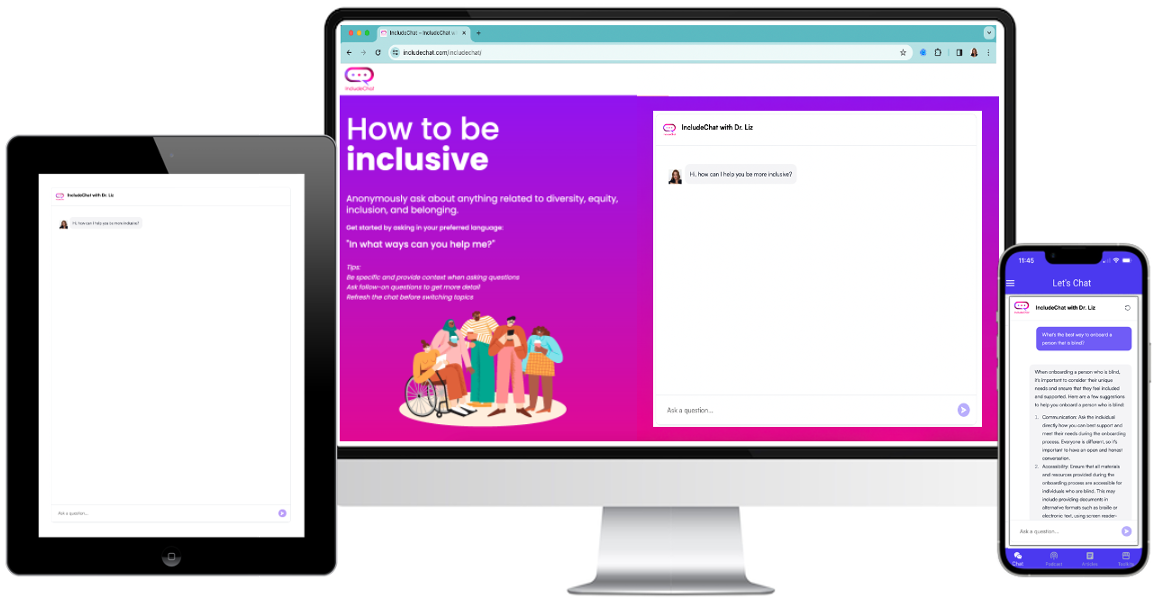Get to know Kanika and Her Inclusion Needs (Female, Ethnic Minority, Racial Minority, Neurodiverse, Chronic Illness)
Kanika is a dog walking, Kilimanjaro climbing, extroverted but alone time needing, Neurodiverse, technical change consultant. Inspirational to others, Kanika identifies as a gender, ethnic and racial minority with a chronic illness. Her superpower is the ability to bring enthusiasm and excitement to an alternative way of seeing the world’s problems – which she gets to use for good in her non-executive role for a housing association with a large diverse group of urban residents.
Summary: The video features an insightful conversation with Kanika Sullivan, a dog-walking, Kilimanjaro-climbing, extroverted, neurodiverse technical change consultant. Kanika shares her experiences as a gender, ethnic, and racial minority with a developmental disability and chronic illness. She emphasizes the need for inclusivity and understanding diverse lived experiences. The discussion highlights the impact of cultural and racial diversity, the importance of representation in literature, experiences of exclusion, and the significance of genuine support in the workplace.
00:02 The podcast is about inclusivity, where Dr. Liz chats with guests to understand their identities and inclusion needs, aiming to create a world where everyone thrives.
-Kanika shares her experience of climbing Kilimanjaro with a heart condition, highlighting her resilience and determination.
-Discussion on ethnic and racial minorities in the UK compared to the US, exploring the terminology and societal perspectives.
-Kanika expresses the impact of reading a book that resonated with her identity, emphasizing the importance of representation and feeling less alone.
06:05 Feeling a lack of connection with role models who share similar experiences can lead to a sense of isolation, but the internet provides spaces for connecting with like-minded individuals, offering hope for the future.
-Importance of role models in feeling connected and understood, especially for underrepresented individuals.
-The internet as a valuable tool for finding community and support among individuals with shared experiences and identities.
-Challenges of feeling disconnected or excluded based on race, ethnicity, and gender, impacting feelings of safety and belonging in different environments.
12:09 Kanika discusses the importance of access to resources and environments that make individuals feel safe, welcomed, and connected, emphasizing the significance of feeling at home in various settings.
-Kanika highlights the significance of having access to hair products, salons, and culturally familiar food, emphasizing the importance of feeling comfortable and at home in one’s surroundings.
-Kanika talks about the importance of being close to people with similar lived experiences, such as cultural events and community gatherings, to create a sense of belonging and connection.
-Kanika reflects on the experience of feeling admired and hyper-conscious of societal norms while appreciating beauty in diverse settings, underscoring the complexities of acceptance and perception.
18:11 Kanika reflects on the importance of acknowledging and appreciating differences in others, especially when it comes to physical attributes like hair, and how compliments can have a significant impact on someone’s day.
-Kanika discusses the significance of embracing diversity and finding beauty in differences, highlighting the attractiveness of uniqueness and individuality.
-The conversation shifts to Kanika’s experience with feedback and perceptions in professional settings, emphasizing the impact of external factors like appearance on how one is evaluated.
-Kanika shares insights on gender dynamics in mentorship and support, contrasting experiences with female and male leaders, and reflecting on cultural differences in receiving assistance.
24:14 Female leadership can face challenges in maintaining authenticity and adapting to organizational cultures. It is crucial for workplaces to create inclusive environments that value individuals holistically, beyond just their professional traits.
-Challenges of female leadership in balancing authenticity and conforming to organizational norms. Self-employment allowed for personal growth and realization of authentic choices.
-Importance of inclusive workplace cultures that recognize individuals holistically, beyond professional traits. Need for environments that value diversity and personal identities.
-Experiences of feeling excluded or pressured to adapt language and behavior in certain environments. The impact of silence on important social issues within workplaces and the need for open dialogue.
30:18 Choosing not to take action is still making a choice, which can perpetuate acceptance of injustice. It is crucial to acknowledge privilege, intersectionality, and the importance of continuous learning and accountability in fostering inclusivity and driving systemic change.
-Recognizing the significance of taking action and not remaining passive in the face of injustice, emphasizing the impact of individual choices on societal acceptance of inequality.
-Acknowledging privilege, understanding intersectionality, and reflecting on personal behaviors that may contribute to systemic issues, highlighting the need for accountability and continuous learning.
-Emphasizing the importance of seeking knowledge, understanding diverse experiences, and actively working towards systemic change by taking responsibility and making a difference.
Picture every employee having 24/7 access to practical steps to be inclusive in what they are doing, when and where they are doing it, in any language.



Want a closer look at IncludeChat?
Schedule a demo of IncludeChat with Dr. Liz
+1 720 589 9431
drliz@theincludeinc.com
Denver, Colorado, USA

